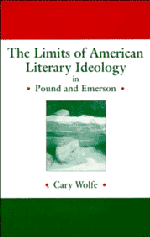6 - Ideologies of the Organic
Published online by Cambridge University Press: 08 February 2010
Summary
Gold and iron are good
To buy iron and gold;
All earth's fleece and food
For their like are sold.
Nor kind nor coinage buys
Aught above its rate.
Fear, Craft and Avarice
Cannot rear a State.
As we are about to see, the substance of these lines, if not their style, could easily have been written in the nineteen thirties by Ezra Pound. In fact, they were appended by Emerson in the eighteen forties to the opening of his essay “Politics” (or was the essay, we might ask of Emerson as of no other, appended to them?). Like all good epigraphs, Emerson's is mobilized in the services of compression, but what exactly is being compressed in this ambitiously simple verse? Are these lines (eight of an opening twenty-six) about the relation or the disrelation of economy, nature, and politics? And does this apparently natural economy, in which things buy only their “like,” make the state necessary, or does it make political structures only redundant? Can those structures express and enforce the truth of nature's law, and if so, why does such a law need to be enforced in the first place?
To begin to answer these questions, we need to note, first, that Emerson here does not really envision some Utopian economy of the future – as a shining light, say, at the nether end of capitalism's tunnel – so much as he declares its real existence in the here and now.
- Type
- Chapter
- Information
- The Limits of American Literary Ideology in Pound and Emerson , pp. 153 - 182Publisher: Cambridge University PressPrint publication year: 1994



